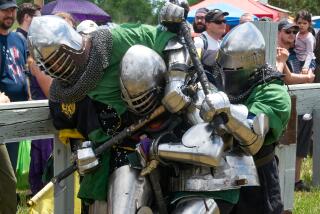Ups and Downs of Jousting
- Share via
Antonio Hernandez picked up his first lance just last week, but no one at the annual jousting tournament in the genteel Virginia town of Hume could tell he was a rookie. In practice heats, he was looking deft at the sport, charging 100 yards on his faithful steed and spearing shower-curtain-ring-size loops dangling from wood posts.
Hernandez, a.k.a. the Riverton Knight of Paddington farm, quickly became a crowd favorite at the Leeds Ruritan Club jousting tournament last week. But his success was overshadowed by grumblings among the locals that their beloved pastime, which dates to the early 1900s in this swath of Virginia, is fading into history.
Newcomers to this territory in Fauquier County, where homes are perched on breezy hills overlooking the Blue Ridge Mountains, are not so keen on the whole jousting bit, tournament organizers lament.
“This was a sleepy, agricultural community. Now it’s becoming like McLean--and nobody ever wants that,” said David Schumacher, the retired Channel 7 news anchor and former NBC and CBS correspondent who emcees the tournament every year. “Some of the new people out here just aren’t nice. They act superior to the locals, and they don’t want to try out the joust or even come to the event.”
It’s a different story across the Potomac River, where jousting has been the official sport of Maryland since 1962, and where the state seal depicts Lord Baltimore as a knight in armor mounted on his charger. The state plays host to more than 50 jousts each year--some of which, like those at the Maryland Renaissance Festival in Crownsville, feature lance-to-lance combat.
“Dangerous? Very much so. Our guys are not choreographed, either. They really try to hit, and sometimes they get hurt. I’ve seen guys with frightening bruises and hematomas,” said Mary Ann Jung, royal court director of the festival, which continues until Oct. 20. “What we’re doing out here takes a lot of training and hard work.”
Only a few spots in Virginia offer jousting tournaments or clubs. On Oct. 12, the National Jousting Assn., based in Mount Solon, Va., will have its annual championship. More than 100 riders are expected to compete.
Jousting originated in Europe in the 10th century as petty but bloody warfare among knights vying for fame and women. Somewhere down the centuries, the combatants decided to tone down the violence, opting to spear rings instead of one another. Previously, ring-spearing was a training exercise for would-be jousters.
The sport surfaced in this country in the mid-1800s. One of the first tournaments was in the Shenandoah Valley, according to the National Jousting Assn.
Residents of Hume would like to see a revival of jousting, which they believe would revive their community as well. In its heyday, the annual event merited a big barbecue dinner: roast beef cooked for six hours, black beans, 400 ears of corn picked the night before, and so much iced tea it had to be served out of trash cans.
“Didn’t we used to play bingo?” Rhonda Stribling asked as she watched Saturday’s joust from a lawn chair with friends.
“Yeah. They even had dancing,” Sally Shoemaker said.
Now, with attendance down to a few dozen, all that’s needed are a single grill for hot dogs and hamburgers, a couple of coolers with drinks and a plate of brownies.
As recently as five years ago, 30 to 40 jousters could be counted on, said Alex Green, the town’s 85-year-old patriarch and a jousting aficionado. On Saturday, their number had dwindled to 13, as the older generation has retired and hung up its chain mail.
Seriously. Riders used to trot out in full medieval attire: chain mail and sashes, with emblems draped over their horses.
Modern-day Sir Lancelots prefer the J. Crew look: jeans and polo shirts.
Hume and its neighboring towns of Markham and Orlean, home to well-known media types and retired CIA operatives, have largely avoided the development sweeping through central and southern Fauquier County, places closer to Washington. But small signs along the byways next to “country-style” developments signal the transformation in progress: J.D. & Associates Roofing and Sheet Metal, Maryland Pools, Middleburg Kitchen & Bath.
Despite such changes, however, the area remains mostly rural, with numerous cattle and horse farms, even a 60-acre apple and peach orchard.
“I had no idea this whole horse thing is so big out here,” said Anna Hofer, 38, a nurse who moved to Virginia from Phoenix about a year ago and came to check out the tournament. “I’ve taken a few horse-riding lessons with my children, but jousting is kind of out of our league.”
More to Read
Go beyond the scoreboard
Get the latest on L.A.'s teams in the daily Sports Report newsletter.
You may occasionally receive promotional content from the Los Angeles Times.








